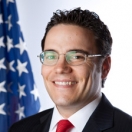
Today I met with the Transitional President of the Central African Republic (CAR), Catherine Samba-Panza, at the White House. As the transitional leader of a country that has been torn by conflict, where nearly half of the 4.6 million people are currently in need of some form of humanitarian assistance and nearly a million are refugees or displaced internally, she faces enormous challenges and a crisis that strikes at the core of our common humanity.
My message to Transitional President Samba-Panza was simple: The United States stands with the people of the CAR and supports the Transitional Government as it attempts to shoulder the difficult but critical task of moving forward with an inclusive national dialogue that focuses on stopping the violence and advancing the political transition. This is not the responsibility of Samba-Panza alone -- we urge all of CAR’s people to work together to foster social cohesion, and to begin the hard work of dialogue and reconciliation. This is the only way to stop the cycle of violence, to bring home the uprooted, and to set the country on the path toward economic growth and sound democratic governance.
Just days ago, on September 15, the United Nations stood up a new peacekeeping mission in the CAR (MINUSCA), which will continue and build on the brave work of African Union forces. We welcome the UN's efforts and are grateful for the ongoing contributions of French and European forces to help stabilize the CAR, as well as the sacrifices they have made alongside African Union forces -- many of whom have joined other troop contributing countries to become part of MINUSCA.
Next week during the events surrounding the UN General Assembly, UN Secretary-General Ban Ki-moon will convene a high-level meeting on the CAR to discuss the critical tasks that remain for the international community and the Transitional Government to place CAR on a sustainable path of recovery. This is another important opportunity to support the CAR Transitional Government as it seeks to extend and improve governance to its citizens.
Through this difficult time, the United States will remain a close partner of the CAR. The U.S. government is providing nearly $146 million in humanitarian assistance, about $100 million in support to African peacekeepers, approximately $15 million toward the rebuilding of the justice sector, and $7.5 million in mediation and reconciliation activities. We are also especially pleased that, on September 14, we resumed operations at the U.S. Embassy in Bangui, yet another important symbol of our commitment.
We will continue to work with international and regional partners to coordinate action, but this alone cannot replace what the CAR Transitional Government, CAR organizations, and the people of CAR must do to promote peace, inspire hope, and advance national reconciliation and the democratic political transition process. As they work to do so, they will continue to have a committed partner in the United States.
Grant T. Harris is Special Assistant to the President and Senior Director for African Affairs at the National Security Council.


